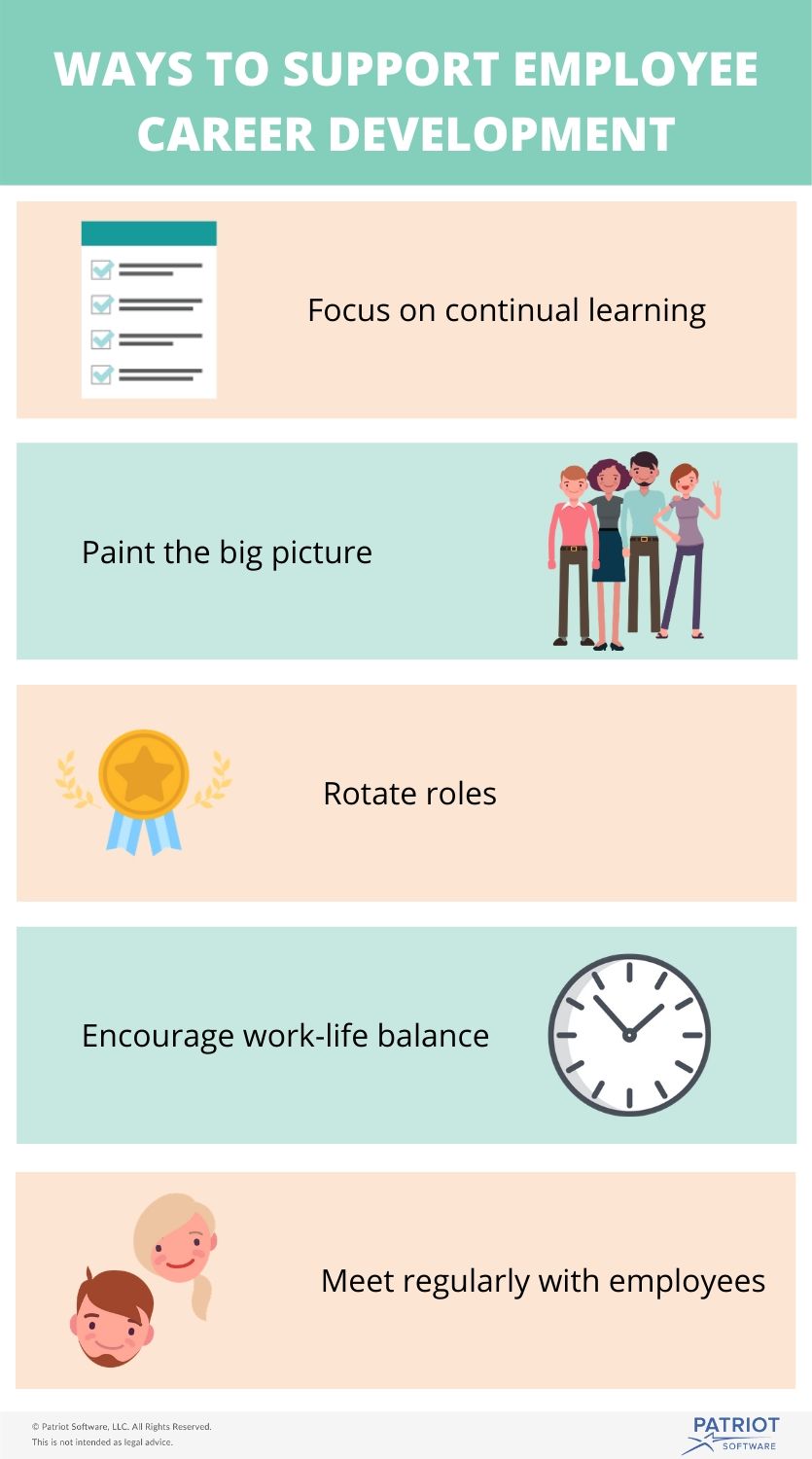As your company grows, your employees should grow with it. But, employees can’t grow along with your business if you don’t give them the opportunity to.
The presence of employee career development at your business can make or break whether top talent sticks around for the long-run. In fact, 76% of employees want opportunities for career growth. And, 74% of employees feel like they’re not reaching their full potential.
If you want your employees to flourish along with your business, you need to learn how to drive employee career development.
Importance of career development
To retain top talent, show employees how they can grow themselves and their careers at your business. Establishing clear career paths helps you:
- Reduce employee turnover
- Boost productivity at work
- Attract top-notch candidates
Career development is a win-win for both employees and employers. Solid career paths can inspire employees and help them improve their skills. Not to mention, career development can encourage employees to be more engaged at work.
On the importance of employee career development, Malte Scholz, CEO and co-founder of Airfocus, said:
One of the best ways to drive employee career development in your company is to show your employees a clear path of progress. In other words, as soon as you hire them, let your employees know that they can advance in their careers. Let them know what they need to do to get a promotion and what their career path will look like once they start working with you. That way, they will have more motivation to learn, work hard, and advance within the company.
5 Ways to support employee career development
If you want to drive employees to stick with your company for the long-run, you need to support and encourage employee career development. So, how in the world do you do something like that? Check out five ways you can launch your employees’ career development at your business.

1. Focus on continual learning
You live and you learn. As a business owner, you know that all too well. You know that your mistakes are what helped you get to where you are today. Mistakes help you grow and teach valuable life lessons. Heck, mistakes help everyone grow. Including your employees.
No matter how old or wise you get, there are always lessons you can learn. If you want your employees to grow as professionals at your business, focus on continuous learning.
Give your employees as many learning opportunities as possible. You can offer things like:
- Continued job training
- Workshops
- Education reimbursement
- Guest speakers
2. Paint the big picture
Every employee plays an important role in your business. After all, that’s why you hired them in the first place. Yes, your employees play a big part in whether or not your business will be successful. But, do your employees know that?
To drive career development, show employees how their roles tie into the company and its mission. Make sure employees know your business mission statement. Discuss the company’s goals, why they’re important, and how each role makes a difference.
Help employees see that their work matters and show them their value. The more employees see their value, the more likely they are to envision a future with your company.
In short, you need to paint the big picture for your employees. Don’t just assume they already know how their work adds value. Continually show employees how they contribute to the business’s mission. And, recognize employees for their achievements along the way.
3. Rotate roles
Doing the same job day in and day out might get a little dull for some employees. If you want your employees to start and end their careers at your business, consider shaking roles up.
Rotating roles is a great way to change up a worker’s daily routine. Not to mention, it can also help employees learn new skills. Encourage staff to work with different departments. That way, they can dabble in a little bit of everything.
If you really want to change things up at your business, consider starting a job rotation program. Rotation programs can help employees become more well-rounded, appreciate co-workers’ duties, and understand your business even more.
If you’re not too keen on the idea of rotating roles, you can encourage different teams and departments to collaborate on projects. This not only encourages employee engagement, but also gives employees the opportunity to expand their skill sets.
4. Encourage work-life balance
According to one source, one-third of Americans work 45 hours or more a week. It’s no secret that hard work is a prerequisite for career advancement. But, hard work doesn’t necessarily have to mean constantly putting in 10-, 11-, or even 12-hour days.
Many employees think that working extra hours and career advancement go hand in hand. But, that doesn’t have to be the case. If you want your employees to be as productive as possible and climb up the career ladder at your business, you need to support a healthy work-life balance.
Of course, you want to encourage your employees to maximize their efficiency and work hard. But, also remind employees to leave time and energy for life outside of work.
In addition to encouraging work-life balance, you can embrace flexible policies at your business. To be more flexible, you can:
- Allow employees to work remotely
- Establish a flextime policy
- Utilize a 9/80 work schedule (e.g., working nine-hour days and having every other Friday off)
5. Meet regularly with employees
If you want to stay up-to-date with your employees’ career aspirations and work goals, follow up with them. To keep an employee’s career development on track, meet with each employee regularly.
Don’t wait for performance review season to roll around to discuss career goals with your workers. Instead, conduct regular meetings to see where your employees’ plans and goals stand. Weekly 1:1 check-ins are a great way to catch up with your workers and chat about their goals and tasks for the week.
You can also check in with employees through:
- Standups
- Emails
- Department meetings
When you do have one-on-one time with each employee, discuss their future with the company. Learn about their expectations, frustrations, and long-term goals. Help employees plot a career path by discussing past and future milestones and achievements.



